Food for thoughts
June 29, 2022
Interviews

► Référence complète : Frison-Roche, M.-A., Droit à l’avortement : « Le processus de sécession est dans la décision » , Entretien avec Laurence Neuer, Le Point, 29 juin 2022.
____
________
June 27, 2022
Compliance: at the moment

Référence complète : Frison-Roche, M.-A., Une alliance entre les entreprises et les Régulateurs (= Droit de la Compliance) peut limiter la portée catastrophique de l'arrêt de la Cour suprême, 27 juin 2022.
____
Nul ne conteste l'importance de l'arrêt rendu par la Cour suprême. La critique en est presque unanime.
Reconnaissons aussi ses mérites : il est clairement et solidement motivé. Plus une décision est catastrophique et plus il est important qu'elle exprime clairement son sens, sa valeur et sa portée : c'est ce qu'a fait la Cour suprême. Celle-ci aurait pu avancer masquée. Non seulement elle a décidé franchement mais l'opinion de Justice Clarence Thomas a formulé clairement la portée de l'arrêt.
Il faut en savoir gré à la Cour car cela permet de réfléchir dès maintenant à ce qui va permettre de contrer la portée systémique contenue clairement dans l'arrêt (I). Gémir et protester ne fait qu'accroître son effet systémique catastrophique (II). Il faut plutôt techniquement réfléchir à accroître la catégorie des droits subjectifs de nature non-politique (IV) et faire intervenir les entreprises en ce, par le Droit de la Compliance, elles sont en charge de concrétiser des droits subjectifs de nature politique (V), la portée globale du Droit de la Compliance montrant une nouvelle fois toute sa puissance et son considérable intérêt (VI).
I. UN ARRET QUI A LE MERITE DE LA CLARTE, Y COMPRIS DANS SA PORTEE
En effet, l'arrêt distingue clairement les droits subjectifs (c'est-à-dire les prérogatives dont sont titulaires les personnes) qui ont une dimension politique et ceux qui n'en ont pas. Pour les premiers, il estime que les auteurs de la Constitution ont voulu que ce soit la volonté des Etats fédérés qui prévalent et que la Cour ne peut pas les déposséder de ce pouvoir politique.
Ainsi le droit subjectif à l'avortement est un droit subjectif de nature politique. C'est donc à chaque Etat des Etats-Unis de décider s'il le donne ou s'il ne le donne pas, puisque ce qui fait naître ce droit subjectif est une décision politique. Par exemple la Californie va continuer à le donner et le Missouri ne va pas le donner. Et la Cour suprême ne s'en mêlera pas. C'est pourquoi, immédiatement, le gouverneur de Californie a réaffirmé que le droit à l'avortement serait effectivement protégé dans l'Etat de Californie et que l'Etat du Missouri a annoncé son abrogation dans le Missouri.
Mais le droit subjectif à l'avortement n'est qu'un exemple. La portée de cet arrêt est immense car tous les droits subjectifs de nature politique sont concernés et Justice Clarence l'a dit clairement. Ainsi le droit au mariage qui bénéficie aux homosexuels est un droit subjectif de nature politique. Les Etats vont pouvoir l'attribuer ou ne pas l'attribuer, le conserver ou le retirer. La jurisprudence de la Cour suprême qui avait élevé ce droit à une valeur fédérale, ôtant un tel pouvoir aux Etats, est d'ores et déjà caduque.
Il n'en sera différemment que si les Constituant ont expressément visé dans le texte même de la Constitution un droit subjectif : par exemple le droit de vote ou le droit de porter des armes. C'est pourquoi l'arrêt de la Cour suprême qui déclare contraire à la Constitution la loi de l'Etat de New-York limitant le port d'arme était avant-coureur de cet arrêt plus général, car c'est le même raisonnement.
C'est donc l'ensemble des droits subjectifs qui font être revus.
C'est clair et c'est net.
Merci à la Cour de n'avoir pas dissimulé la portée catastrophique de son arrêt, d'en avoir donné le sens, la valeur et la portée.
La portée en est catastrophique parce que systémique : les Etats vont - et ils le font déjà - se séparer suivant la conception politique qu'ils ont de tel ou tel sujet (les armes, les femmes, les discriminations, le travail, les étrangers, etc.) et la population vivant aux Etats-Unis va migrer entre les Etats : les Etats vont se désunir.
Le processus de Sécession est dans l'arrêt.
Sans doute l'arrêt a-t-il été adopté pour cela.
II. LES GEMISSEMENTS ET LES CRITIQUES ACCROISSENT LA PORTE CATASTROPHIQUE DE L'ARRET
L'on peut gémir sur le sort des victimes de cet arrêt, et elles sont très nombreuses. L'on peut vouer aux gémonies les auteurs de cet arrêt.
Mais cela ne sert à rien (c'est vrai que cela soulage).
Car plus la critique des auteurs et la frayeur des victimes sera grande et plus la sécession va s'opérer rapidement : c'est ce que veulent ceux qui ont inspiré cet arrêt, puisque les victimes vont migrer dans les Etats qui protègent les droits de nature politique, les autres vont migrer dans les Etat qui les annihilent, les Etats-Unis vont s'isoler du monde extérieur (notamment dans sa relation avec l'Europe).
Il faut plutôt réfléchir à quoi faire pour arrêter cet effet systémique.
Il y a deux voies pour cela : réfléchir sur ce que sont les "droits subjectifs de nature politique" pour dégager ceux qui ne le sont pas et qui ne sont donc pas dans la main des Etats fédérés (III) ; concernant les "droits subjectifs de nature politique", mettre en valeur que, par le Droit de la Compliance défini substantiellement par ses Buts Monumentaux, les entreprises cruciales ont pour fonction de défendre par leurs propres forces les droits subjectifs des personnes, en incorporant la dimension politique de ceux-ci, en alliance avec les Autorités publiques (IV). C'est là que l'on redécouvre, comme en matière de climat, que la nature globale du Droit de la Compliance, est son atout le plus précieux et qu'il faut arrêter de critiquer son "effet extraterritorial".
III. LA VOIE PAR LA NOTION MEME DE "DROITS DE NATURE NON POLITIQUE", NE RELEVANT DONC PAS DU POUVOIR POLITIQUE EXCLUSIF DES ETATS
Si les droits subjectifs de nature politique ne sont plus protégés par la Cour suprême, sauf à être écrits noir sur blanc dans la Constitution américaine ou avoir été dans l'esprit des pères-fondateurs, a contrario les droits subjectifs de nature non-politique peuvent continuer de l'être par la Constitution quand bien même ils n'ont pas été dans l'esprit des pères fondateurs (car l'on peut penser que les deux conditions sont cumulatives).
En effet, c'est en raison de cette "nature politique" que les Etats fédérés ont le pouvoir de les dessiner à leur guise, de les attribuer ou non, de les récuser, etc. Mais s'il s'agit de droits subjectifs de nature non politique, alors les Etats fédérés n'ont pas un pouvoir politique exclusif sur eux : cette règle juridique de principe relève de la tautologie.
Avoir affirmé que le droit à l'avortement était un droit de nature politique était soutenable mais n'était pas indiscutable. si cela n'avait pas été discuté, c'est parce qu'on ne connaissait pas encore le raisonnement qui désormais va conduire la Cour suprême.
Puisqu'elle a, par son arrêt fondateur, donné la summa divisio, qui doit la tenir et valoir pour elle précédent et guide pour le futur, l'enjeu est de sortir le plus possible de droits subjectifs de la catégorie des droits subjectifs de dimension "politique" pour les faire rentrer dans la catégorie des droits subjectifs de dimension "non politique".
L'on peut penser que par nature un droit subjectif n'est pas de nature politique (il doit être présumé comme tel) et que c'est celui qui prétend qu'un droit subjectif est de nature politique qui doit démontrer cette nature-là.
Avant même cet exercice de charge de preuve, qu'il sera bon de rappeler à chaque fois néanmoins, il faut dès maintenant mettre en catégorie les droits subjectifs selon cette summa divisio.
Il faut le faire rapidement et immédiatement prendre branche du Droit par branche du Droit, décomposer et lister pour soutenir que les droits subjectifs en cause ne sont pas politiques.
La Cour suprême, en raison de sa composition, va avoi tendance à classer comme non politiques, les droits subjectifs qui lui plaisent, afin de leur conférer une protection constitutionnelle (comme les droits subjectifs en matière de contrat et en matière de concurrence) et à classer comme politiques les droits subjectifs qui ne lui plaisent pas, afin de permettre aux Etats dominés par les conservateurs de détruire toute protection (face à quoi elle pourra dire que, désolé, elle ne peut s'en mêler, comme les droits subjectifs en matière de droit des personnes).
Or, comme cela a été souligné (M.-A. Frison-Roche, et J.-C. Roda, Droit de la concurrence, Précis Dalloz, 2022), les droits subjectifs en Droit de la concurrence sont très souvent de nature politique. La Cour suprême qui va vouloir les protéger - car elle est très pro-entreprises, va être amenée à élargir la catégorie des droits subjectifs qualifiés de non-politiques à des prérogatives qui le sont en réalité. Cela sera également le cas pour les prérogatives concernant les licenciements, etc., et tout ce qui tourne autour de la liberté contractuelle. Ainsi, via le Droit économique, la catégorie même des "droits subjectifs à dimension non-politique" ayant valeur constitutionnelle peut s'accroître et par ricochet bénéficier aux personnes dans des situations non directement économiques.
Cet exercice de mise en catégories. Une question technique et il faut construire immédiatement un corpus clair pour que face à cela, qui est clairement acquis, il y est une classification qui entrave cette stratégie juridique.
Par ailleurs, l'on peut agir au sein même de cette catégorie des droits subjectifs de nature politique.
IV. LA VOIE PAR L'AFFIRMATION DE LA PRISE EN CHARGE DES "DROITS DE NATURE POLITIQUE" PAR LES ENTREPRISES : LE DROIT DE LA COMPLIANCE
Le Droit de la Compliance est défini, dans sa définition riche, comme ce qui vise à concrétiser les droits fondamentaux des personnes. En cela, ceux-ci constituent le But Monumental du Droit de la Compliance, qui constitue la définition même de cette nouvelle branche du Droit.
🔴M.-A. Frison-Roche, Les droits subjectifs, outils premiers et naturels du Droit de la Compliance, in Les outils de la compliance, 2021
🔴M.-A. Frison-Roche, Les buts monumentaux, cœur battant du Droit de la Compliance, in Les buts monumentaux de la compliance, 2022.
Dans ce sens, les entreprises, soit par force parce que les Autorités publiques l'exigent, soit de gré parce que cela correspond à leurs valeurs et à leurs propres finalités (éthique, RSE, entreprises à mission) ont pour mission de rendre effectifs les droits des personnes.
Ce sont elles qui peuvent et doivent intervenir pour édicter, défendre et concrétiser les droits des personnes, non seulement leurs employés et les personnes dont elles répondent, mais encore les parties prenantes.
V. L'ALLIANCE ENTRE LES ENTREPRISES CRUCIALES ET LES AUTORITES PUBLIQUES
Pour cela, les entreprises, qui ne sont pas légitimes à régenter le monde, doivent faire alliance avec les Autorités publiques, notamment les autorités de régulation et de supervision.
Les Autorités publiques de régulation et de supervision ont elles-mêmes développé des activités d'information et de pédagogie, au cœur de leur activité régulatrice, qui peut ainsi converger avec l'activité de Compliance des entreprises.
En effet, puisque les droits subjectifs de nature politique sont méconnus, c'est en termes de "culture commune" et d'éducation que la question doit être prise.
🔴M.A. Frison-Roche, La formation, contenu et contenant du Droit de la Compliance, 2021.
VI. LA PORTEE PAR NATURE GLOBALE (DITE "EXTRATERRITORIALE") DU DROIT DE LA COMPLIANCE
Cette intervention des entreprises est d'autant plus adéquate que le Droit de la Compliance en a fait depuis la naissance de cette branche du Droit des sujet de droit en tant qu'elles sont "en position" de faire quelque chose.
Or, ici, c'est exactement le cas : les entreprises sont en position de faire quelque chose, et pas seulement les entreprises américaines. Toutes les "entreprises cruciales" peuvent agir.
Elles vont pouvoir agir d'une façon globale, en alliance avec les Autorités publiques qui les supervisent.
Et l'on va enfin reconnaître que l'effet extraterritorial du Droit de la Compliance, que l'on a tant critiqué à propos d'un sujet pourtant limité (les embargos) est ce qui rend cette branche du Droit si adéquate pour le mouvement dramatique que l'arrêt de la Cour suprême vient d'enclencher.
Cela montre que le mouvement amorcé pour renouveler le rapport avec le principe de Souveraineté vient de trouver un puissant accélérateur, en se détachant, non pas des Autorités publiques, mais des Etats.
🔴M.-A. Frison-Roche, Le principe de proximité systémique active, corolaire du renouvellement du Principe de Souveraineté par le Droit de la Compliance, 2022.
_______
June 15, 2022
Publications

► Full Reference: Frison-Roche, M.-A.., La dynamique des Buts Monumentaux du Droit de la Compliance (("The Dynamics of the "Compliance Law Monumental Goals"), in Frison-Roche, M.-A. (dir.), Les buts monumentaux de la Compliance, series "Régulations & Compliance", Journal of Regulation & Compliance (JoRC) and Dalloz, to be published.
____
► English Summary of this Article: This article constitutes the afterword of the book Les buts monumentaux de la Compliance.
Its purpose is to show the consistency of the book, in that the Monumental Goals themselves, by their normativity, give Uniqueness to Compliance Law, giving it simplicity and strength.
Restituting each of the contributions and articulating them all in an overall demonstration, this article highlights this consistency of the Compliance mechanisms which join the primary function of the Law: the protection of human beings, now and in the future.
___
► read the presentations of the other Marie-Anne Frison-Roche's contributions in this book:
📝 Les Buts Monumentaux, cœur battant du Droit de la Compliance
📝 Définition du Principe de Proportionnalité et Définition du Droit de la Compliance
____
This article is free access.
Read the article in English⤵️
May 4, 2022
Thesaurus : Soft Law

► Référence générale : Haut Comité juridique de la place financière de Paris, Rapport sur l'extraterritorialité du Droit de l'Union européenne, mai 2022.
____
_____
April 14, 2022
Publications

♾️ suivre Marie-Anne Frison-Roche sur LinkedIn
♾️ s'abonner à la Newsletter MAFR Regulation, Compliance, Law
____
► Référence complète : Frison-Roche, M.-A., Les Buts Monumentaux, cœur battant du Droit de la Compliance, in Frison-Roche, M.-A. (dir.), Les buts monumentaux de la Compliance, collection "Régulations & Compliance", Journal of Regulation & Compliance (JoRC) et Dalloz, à paraître.
____
► lire le document de travail sur lequel cet article est basé
___
► Résumé de l'article : L'on peut définir cette branche du droit comme l'ensemble des procédés obligeant les entreprises à donner à voir qu'elles respectent l'ensemble des réglementations qui s'appliquent à elles. L'on peut aussi définir cette branche par un cœur normatif : les "buts monumentaux". Ceux-ci permettent de rendre compte du droit positif nouveau, rendu ainsi plus clair, accessible et anticipable. Ils reposent sur un pari, celui du souci de l'autre que les êtres humains peuvent avoir en commun, forme d'universalité.
Par les Buts Monumentaux, apparaît une définition du Droit de la Compliance qui est nouvelle, originale et spécifique. Ce terme nouveau de "Compliance" désigne en effet une ambition nouvelle : que ne se renouvelle pas à l'avenir une catastrophe systémique. Ce But Monumental a été dessiné par l'Histoire, ce qui lui donne une dimension différente aux États-Unis et en Europe. Mais le cœur est commun en Occident, car il s'agit toujours de détecter et de prévenir ce qui pourrait produire une catastrophe systémique future, ce qui relève de "buts monumentaux négatifs", voire d'agir pour que l'avenir soit différent positivement ("buts monumentaux positifs"), l'ensemble s'articulant dans la notion de "souci d'autrui", les Buts Monumentaux unifiant ainsi le Droit de la Compliance.
En cela, ils révèlent et renforcent la nature toujours systémique du Droit de la compliance, comme gestion des risques systémiques et prolongement du Droit de la Régulation, en dehors de tout secteur, ce qui rend disponibles des solutions pour les espaces non-sectoriels, notamment l'espace numérique. Parce que vouloir empêcher le futur (faire qu'un mal n'advienne pas ; faire qu'un bien advienne) est par nature politique. Le Droit de la Compliance concrétise par nature des ambitions de nature politique, notamment dans ses buts monumentaux positifs, notamment l'égalité effectif entre les êtres humains, y compris les êtres humains géographiquement lointains ou futurs.
Les conséquences pratiques de cette définition du Droit de la Compliance par les Buts Monumentaux sont immenses. A contrario, cela permet d'éviter les excès d'un "droit de la conformité" visant à l'effectivité de toutes les réglementations applicables, perspective très dangereuse. Cela permet de sélectionner les outils efficaces au regard de ces buts, de saisir l'esprit de la matière sans être enfermé dans son flot de lettres. Cela conduit à ne pas dissocier la puissance requise des entreprises et la supervision permanente que les autorités publiques doivent exercer sur celles-ci.
L'on peut donc attendre beaucoup d'une telle définition du Droit de la Compliance par ses Buts Monumentaux. Elle engendre une alliance entre le Politique, légitime à édicter les Buts Monumentaux, et les opérateurs cruciaux, en position de les concrétiser et désignés parce qu'aptes à le faire. Elle permet de dégager des solutions juridiques globales pour des difficultés systémiques globales a priori insurmontables, notamment en matière climatique et pour la protection effective des personnes dans le monde désormais numérique où nous vivons. Elle exprime des valeurs pouvant réunir les êtres humains.
En cela, le Droit de la Compliance construit sur les Buts Monumentaux constitue aussi un pari. Même si l'exigence de "conformité" s'articule avec cette conception d'avance de ce qu'est le Droit de la Compliance, celui-ci repose sur l'aptitude humaine à être libre, alors que la conformité suppose davantage l'aptitude humaine à obéir.
C'est pourquoi le Droit de la Compliance, défini par les Buts Monumentaux, est essentiel pour notre avenir, alors que le droit de la conformité ne l'est pas.
____
📝 lire la présentation générale du livre, Les Buts Monumentaux de la Compliance, dans lequel l'article est publié.
_____
► Lire les présentations des autres contributions de Marie-Anne Frison-Roche dans cet ouvrage :
📝 Les Buts Monumentaux, cœur battant du Droit de la Compliance,
________

Updated: April 4, 2022 (Initial publication: Oct. 4, 2021)
Publications

🌐follow Marie-Anne Frison-Roche on LinkedIn
🌐subscribe to the Newsletter MAFR. Regulation, Compliance, Law
____
► Full Reference: M.-A. Frison-Roche, The Hypothesis of the category of Systemic Cases brought before the Judge, Working Paper, October 2021 and April 2022.
____
► This working paper has served as the basis for an introductory speech 🎤L'hypothèse de la catégorie des causes systémiques (The Hypothesis of the cateory of Systemic Cases), in a more general conference which I coordinated and moderated, 🧱L'office du juge et les causes systémiques, which is part of a general cycle covering Penser l'office du juge, specific conference attending the 9th May 2002 into the Grand Chamber of the Cour de cassation.
This Working Paper was drawn up in October 2021 to build the conference on the assumption that among the diversity of "cases" brought to the courts by litigants, some constitute a specific category: "systemic cases", justifying treatment that is both specific (in that they are systemic, calling in particular for procedural solutions common to all and distinguishable from the treatment of non-systemic cases) and common treatment beyond the diversity of judges who deal with them (judicial and administrative judges, criminal and non-criminal judges, French and non-French judges, judges of the member-States legal orders and European Union judges, etc.).
This working paper does not aim to deal with the whole subject, i.e. both to determine this category of "systemic causes" and the consequences that must be drawn from it for the judge's office, since that is the very purpose of the conference, which is built around several presentations: it aims to deal with the first part of the subject, i.e. the very existence of this new processual category, which is "systemic causes", leaving for other work the practical consequences to be drawn from it in the processual treatment that it calls for.
____
📝This Working Paper is also the basis of a forthcoming article
____
► Summary of the Working Paper: xx
________
Read below the developments⤵️
Feb. 9, 2022
Teachings : Droit de la régulation bancaire et financière - semestre 2022
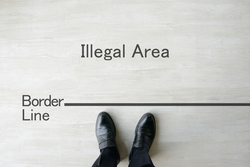
 ► Référence complète : Frison-Roche, M.-A., Prévention et sanction des Abus de Marchés, in Leçons de Droit de la Régulation bancaire et financière, Sciences po (Paris), 9 février 2022.
► Référence complète : Frison-Roche, M.-A., Prévention et sanction des Abus de Marchés, in Leçons de Droit de la Régulation bancaire et financière, Sciences po (Paris), 9 février 2022.
____
► Résumé de la leçon sur les Abus de marché : Dans une conception classique et du Droit et du "libre marché", le principe est la liberté d'action de la personne. Même si l'exercice de cette liberté, voire d'un droit subjectif peut causer un dommage, par exemple un dommage concurrentiel, c'est en quelque sorte le prix légitime d'une société libre et concurrentielle. Ainsi dans une conception libérale, seul l'abus est sanctionné, c'est-à-dire l'exercice fautif que l'on fait de sa liberté ou de son droit, allant parfois jusqu'à l'exigence d'une faute qualifiée.
Mais les secteurs bancaires et financiers ne sont pas gouvernés par le principe de libre concurrence. Ils sont gouvernés par le principe de régulation, le principe de concurrence n'y a qu'un rôle adjacent. Cela ne pourra qu'engendrer de graves difficultés lorsque le Droit de la concurrence et le Droit bancaire et financier font s'appliquer d'une façon cumulée ou confrontée sur une même situation.
Les marchés financiers sont construits sur le principe de régulation qui pose le principe de transparence et de partage d'une information exacte : c'est ainsi que l'intégrité des marchés financiers est assurée, l'Autorité des Marchés financiers en étant le gardien.
La prévention et la sanction des "abus" de marché est donc non pas une part résiduelle du Droit financier, mais un pilier de celui-ci, contrairement au Droit des marchés ordinaires concurrentiels, sur lesquels l'opacité et le non-partage des informations est la règle.
Cela explique l'état du droit des "abus de marché", dont l'effectivité de la prohibition est essentielle pour le bon fonctionnement ordinaire des marchés financiers. Leur prohibition nationale a été harmonisée par le Droit de l'Union européenne, à travers des textes dont les signes reprennent l'appellation anglaise : Market abuses (ainsi le nouveau Règlement communautaire sur les abus de marché est dit Règlement MAR (Market Abuses Regulation) et la directive qui l'accompagne MAD (Market Abuses Directive).
Il sanctionne un certain nombre de comportements, qui portent atteinte à l'intégrité des marchés,
Mais il n'exprime plus des exceptions par rapport à un principe : des fautes par rapport à des libertés ou à des droits. Il exprime des moyens par rapport à des principes dont la sanction des abus ne constitue que la concrétisation de principes dont ils sont la continuité même : l'efficacité du marché, son intégrité, sa transparence, l'information de l'investisseur.
C'est pourquoi la sanction des abus de marché ne sont pas du tout un phénomène périphérique par rapport à la Régulation des marchés financiers et à l'activité et au fonctionnement des bancaires, comme l'est le Droit pénal : elle est au contraire à la fois ordinaire et centrale. Cette différence des deux ordres publics va se retrouver dans la question lancinante de la sanction pénale et de la sanction administrative des mêmes abus de marché (par exemple "manquement d'initié" et "délit d'initié", qui ont tendance à se cumuler dans des techniques de répression qui seront l'objet de la prochaine leçon.
_____
🔎 Accéder aux slides servant de support à la leçon sur les abus de marché
🔎 Revenir aux bases avec le Dictionnaire bilingue du Droit de la Régulation et de la Compliance
🔎 Approfondir par la Bibliographie générale de Droit de la Régulation bancaire et financière
🔎 Revenir à la présentation générale du cours
🔎 Se reporter au plan général du cours
____
Utiliser les matériaux ci-dessous pour aller plus loin et pour préparer votre conférence de méthode ⤵️

Updated: Feb. 5, 2022 (Initial publication: Oct. 10, 2021)
Publications

 ► Full Reference: Frison-Roche, M.-A., Duty of Vigilance, Whistleblowing and International Competitiveness, Working Paper, September 2021.
► Full Reference: Frison-Roche, M.-A., Duty of Vigilance, Whistleblowing and International Competitiveness, Working Paper, September 2021.
____
🎤 this Working Paper is the basis for a conference , in the colloquium Effectiveness of Compliance and International Competitiveness, co-organised by the Journal of Regulation & Compliance (JoRC) and the Center for Law and Economics of the Panthéon-Assas University (Paris II), November 4, 2021
____
📝this Working Paper is also the basis for an article. This article is to be published ⤵
in its French version in the book 📕Les buts monumentaux de la Compliance, in the series 📚Régulations & Compliance
in its English version in the book 📘Compliance Monumental Goals, in the series la collection 📚Compliance & Regulation
____
► Working Paper Summary: The "Compliance Tools" are very diverse. If it has been chosen to study more particularly among these the obligation of vigilance and the whistleblower, these rather than others and to study them together, it is because they present in the perspective of the specific topic chosen, namely "international competitiveness", and for companies, and for economic zones considered, and for legal system inseparable from them, a uniqueness: these are mechanisms which release Information.
By order of the law, the company will not only stop ignoring what it covered with the handkerchief that Tartuffe held out to it or that a conception of Company Law legitimately allowed it to ignore. This article does not examine if this revolution made by Compliance Law expresses in the legal system is on the one hand legitimate and on the other hand effective: the article measures what is happening at the regard to "international competitiveness".
Compliance Law is therefore be examined here through its instruments, and not in relation to its normativity. In fact, its instruments are intended to provide Information and to make this information available, in its presentation, in its intelligibility and in the hands of those who are able to use Information in perspective of the Compliance Monumental Goals, achieving them.
Regarding this central notion of Information, international competitiveness will be more particularly concerned because Compliance Law will oblige the company itself to seek out, then expose to everyone's eyes, in particular its competitors, its weaknesses, its projects, its alliances, its flaws. This does not pose a problem if its competitors themselves are often subject to this new branch of Law, which goes far beyond transparency, which is already a new mechanism because a company is not a transparent organization and Competition Law that governs ordinary businesses never required this. But if they are not subject to this incredibly special branch of Law that is Compliance Law, then there is a distortion of competitiveness by the very fact of the Law.
It is possible to pretend that the markets like virtue, that they give it credit because they are themselves based on the idea of "promise", which is ultimately based on a moral concept, but this provision of Information to others, while others remain opaque, is a major problem of competitiveness, which the legal requirement of "loyal commercial practices" only very partially considers.
Therefore, it is necessary to first examine what is the economic and financial power of the information captured by the company on itself thank to Compliance Law making available to all but firstly to the compagny itself through the whistblowing mechanism, organised by the laws, differently in the US and Europe (I). Compliance Law also obliges companies to be accountable not only for what they do but also for what others do for them. Through the obligation of Vigilance, objective Ex Ante obligation and duty, the company obtains a power of Information on others which could well resolve what is often presented as the dispute aporetic of the extraterritoriality of Compliance Law, thus making accountable companies hitherto protected by their "preserved" legal system and thereby affected by the effectiveness of Compliance Law (II).
____
read below the developments
Jan. 25, 2022
Thesaurus : Doctrine
► Référence complète : Feeley, M. et Langford, M. (ed), The Limits of the Legal Complex Nordic Lawyers and Political Liberalism (ed), Oxford University Press, 2022.
____
📗Cet ouvrage peut être consulté en libre accès sur le site de l'éditeur.
Nov. 27, 2021
Conferences

► Full Reference: Frison-Roche, M.-A., Chair for "The temporal dimension: Imminence and Intertemporally", in Climate Change Cases before National and International Courts Cross-fertilization and Convergence", November 27, 2021, Paris.
____
Summary of the panel presentation: The specific topic of our panel is the “temporal dimension” of the judicial cases of Climate change.
We shall listen to two great experts on this topic, which is Time.
Listening the other previous speakers, I understand how this topic is important, because Climate Change requires an immediate action and it create a political issue, because everyone comes before courts.
A basis and fundamental problem, because the times are not adjusted.
let's come back to basic notions, to have three times : “past, present, future”.
The issue of Climate Change is in the Future, the necessity of Action is in the Present and the basis temporal question is to know if Courts are the bodies adequate to responde ; maybe it is inevitable that Judge must be recreate their office because the time of the classical judicial office is the Past.
Immediately, this simple et huge problem appears : in a classical repartition, the judge is the legal character to intervenir for the Past, the present (maybe is for you and me), and the future is the time for the State, and more precisely for the Parliament.
But the climate change is a huge topic, not in the past, not in the present, but in the future.
Therefore a gap exists between the time of the topic and the time of the court before the case is explained for obtaining a solution : how to give a good answer ? Judge maybe must travel in time, from past to future …. Maybe, he must, but might he?
Classically, the judge can anticipate a very next future, but not the more distant and systemic future. Climate change belongs to the second one.
This is why the title of this panel is non only about the necessity to take in consideration the “imminence” but also the “intertemporally” : maybe court are the sole able to create this intertemporality between Past and Future, and by this way to obtain from States and companies to do something immediately !
By two legal ways.
Courts can stay in Past, supervising States, if they dispose of effective legal decisions taken by States in the past about Climate Change (essentially Paris Agreement, for instance transposed in the French legal system by a formal law). This is why an efficient judicial solution would be the possibility for the courts to oblige State to implement their more or less committment they had taken in the past for the future (as the Conseil d’Etat did in the Commune de Grande-Synthe Cas Law).
Even for that, the courts must adopt a creative notion of what is a commitment from a State through a Law... ; as they must do about private companies comitment (in their codes of conduct or soft law of corporate social responsability).
But what to do if States didn’t take such commitment ?
Some can allege Courts are not Parliaments and are not legitimate to rule for the future … It is a political issue, a very classical one but very accurate for Climate change (where States and companies are face to courts...) and maybe And as our colleague said, judicial system is quite technically weak to concretize human rights.
Therefore, the second way, more innovative, est the new use of Tort Law : no more a liability Ex Post, but a responsibility Ex Ante. In every legal system, even in Civil Law systems, Tort Law is conceived by courts (for instance in French Law).
If the new reasoning is conveived in Ex Ante, Tort Law must be a set of legal tools to reach the monumental tools to reach the "Monumental Goal" (being by nature future) which is the Climate Change stopping.
In this teleological reasoning, the admissibility and the choice remedies, must be adapted to obtain what is central : the effectivity and the efficiencicy.
In this sens, the judgement between two parties (which was an Ex Post act) may be conceived as an systemic efficient action (which was an Ex Ante act), because it must be.
_____
Nov. 10, 2021
Thesaurus : Doctrine
Référence complète : Kemfouet, E.-D., Énergies renouvelables, transition énergétique et enjeux climatiques en droit africain, Revue Africaine de Droit de l’Environnement (African Journal of Environmental Law),n°6, nov. 2021.
___
______
Émile-Derlin KEMFOUET
Nov. 4, 2021
Conferences
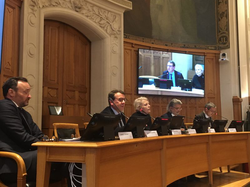
 ► Référence complète: Frison-Roche, M.A., Appréciation du lancement d'alerte et de l'obligation de vigilance au regard de la compétitivité internationale (" ("Assessment of Whistleblowing and Vigilance Duty with regard to international competitiveness"), in Benzoni, L., Deffains, B. et Frison-Roche, M.-A.(dir.) , Effectivité de la Compliance et Compétitivité internationale("Compliance Effectivity and International Competitiveness"), seminar co-organised by the Journal of Regulation & Compliance (JoRC) and the Centre de recherche sur l'Économie et le Droit (CRED) of the Panthéon-Assas University, November 4, 2021.
► Référence complète: Frison-Roche, M.A., Appréciation du lancement d'alerte et de l'obligation de vigilance au regard de la compétitivité internationale (" ("Assessment of Whistleblowing and Vigilance Duty with regard to international competitiveness"), in Benzoni, L., Deffains, B. et Frison-Roche, M.-A.(dir.) , Effectivité de la Compliance et Compétitivité internationale("Compliance Effectivity and International Competitiveness"), seminar co-organised by the Journal of Regulation & Compliance (JoRC) and the Centre de recherche sur l'Économie et le Droit (CRED) of the Panthéon-Assas University, November 4, 2021.
____
►This intervention is thematic ; it is articulated with those more general carried out in introduction by Bruno Deffains particularly focused on the necessarily global scope of Compliance and in conclusion by Laurent Benzoni on Compliance as a potential new pillar of industrial policy, the whole of the colloquium having been conceived by the three of us.
____
📅 this scientific event is part of the 2021 colloquia cycle, organized by the Journal of Regulation & Compliance (JoRC) and its Universities partners, on the general theme of Compliance Monumental Goals.
____
🚧 read the bilingual Working Paper, basis of this conference
____
►see the slides used during the conference
____
► Conference Summary: First of all and independently of the technical topic itself which, as the slides show, is focused on these two techniques based on Information which are the Whistleblowing and the Vigilance duty, it is essentiel to pose that the techniques themselves are conceived totally differently depending on whether Compliance Law is conceived as a mechanical process and totally binding to fully comply with all applicable regulations and to demonstrate it in advance, under the threat of terrible fines, this definition being the both completely frightening and meaningless since what these applicable regulations contains is irrelevant, in which case the prospect of competitiveness boils down to notions of costs and also procedural considerations of foreseeability and legal certainty; or if Compliance Law is conceived as a new and substantial branch of Law Ex Ante developed to detect and prevent the systemic crises being before us, of which the climate crisis is unfortunately the epigone and which requires above all Action, an action of such magnitude which requires the alliance of all forces, that of States, companies, courts and people, in a renewal of concepts, particularly legal ones, and in the indifference of territories, which puts Compliance immediately at its right level: the world, because the scientifically emerging crisis is global, the so-called "extraterritoriality" theme now being misnamed. From this new general conception, the Vigilance obligation, about which so much was said when it was imposed in France in 2017, is the advanced point, soon taken up in Europe and whose scope must be naturally global, because that Compliance Law is consubstantially global.
Taking up more technically the legal techniques of Compliance and confronting them with the Competitiveness of firms, it is necessary that these Compliance Tools do not harm this Competitiveness because Compliance Law , supporting immense ambitions, can only function through an alliance between political wills (with great pretensions, i.e. save the planet) and the entities which are able to concretize them (the crucial economic operators): the Compliance tools designed by legal systems must preserve the companies which put them in place and never favor their competitors.
On the basis of this principle, it is possible to assess these two legal techniques, namely the whistleblowing and the Vigilance duty, which both capture Information, which, as such, gives them a uniqueness and places them in the global Competition for Information.
Taking the whistleblowing first, it appears that its first beneficiary is the company itself since it discovers a weakness and can therefore remedy it. This is why, beyond the principle of protection of the whistleblower by the access of somebody to the legal statute conceived in France by the law known as "Sapin 2", it is criticized that all the incentives are not used for that the holder of such information transmits it to the manager and that the same law continues to require the absence of financial counterpart, the "heroic figure of the whistleblower and the refusal of his remuneration depriving the company of a means information and improvement. The American solution is better and tt is regrettable that the law transposing the European Directive maintains this ineffective conception. But French legislation has on the contrary developed the right incentive as to the person whom the information must be transmitted to is the manager, then externally if the latter does nothing. The solution is better that the American solution because the incentive is thus made to push the internal manager to act and put an remedy to the internal dysfunction, which increases the competitiveness of the company.
Even more, even if it seems counter-intuitive, the French Vigilance Duty greatly increases the competitiveness of the companies which are subject to it. Indeed, the 2017 Law by obliging them to prevent and fight against human rights and environment violations has tacitly given them all the necessary powers to do so, in particular the power to capture Information on third-party companies, including ( and even above all) those which are not subject to transparency obligations. In this, companies, insofar as they are personally responsible, hold a supervisory power over others, a power which allows Compliance Law to globalize and which, in the process, increases their own power. This is why the obligation of vigilance is in many respects a boon for the companies which are subject to it. The resumption of the mechanism by the next European Directive, itself indifferent to the territory, will only strengthen this global power on other firms, even foreign ones.
____
► This conférence et le document de travail servent de base à un article dans un ouvrage :
📝This conference and the Working Paper constitute the basis for an article:
📕 in its French version in the book Les buts monumentaux de la Compliance, in the Series 
📘 in its English version in the book Compliance Monumental Goals, in the Series 
_________
Oct. 22, 2021
Compliance: at the moment

Oct. 22, 2021
Publications

 ► Référence complète : Frison-Roche, M.-A., Le principe de proximité systémique active, corolaire du renouvellement du Principe de Souveraineté par le Droit de la Compliance, document de travail, octobre 2021
► Référence complète : Frison-Roche, M.-A., Le principe de proximité systémique active, corolaire du renouvellement du Principe de Souveraineté par le Droit de la Compliance, document de travail, octobre 2021
____
🎤 Ce document de travail avait été élaboré pour servi de base à l'intervention de clôture du colloque Effectivité de la Compliance et Compétitivité internationale, coorganisé par le Journal of Regulation & Compliance (JoRC) et le Centre de recherche en Droit et en Économie de l'Université Panthéon-Assas (Paris II), se tenant le 4 novembre 2021, Salle des Conseils, Université Panthéon-Assas (Paris II).
🚧Il était corrélé à un premier document de travail ayant pour thème l'Appréciation du lancement d'alerte et de l'obligation de vigilance au regard de la compétitivité internationale, élaboré également pour ce colloque.
La gestion du temps n'a permis que la prise de parole sur ce thème-ci relatif aux techniques juridiques du lancement d'alerte et de l'obligation et devoir de vigilance.
____
📝Ce présent document de travail a donc été ultérieurement utilisé pour constituer la base d'un article, Le principe de proximité systémique active, corolaire du renouvellement du Principe de Souveraineté par le Droit de la Compliance, lequel est publié⤵
📕dans sa version française dans l'ouvrage Les buts monumentaux de la Compliance, dans la collection 📚 Régulations & Compliance
📘dans sa version anglaise dans l'ouvrage Compliance Monumental Goals, dans la collection 📚 Compliance & Regulation
____
► Résumé du document de travail : Les rapports entre le Droit de la Compliance et la notion de Souveraineté sont abîmés par une mauvaise querelle de départ, souvent appelée celle de "l'extraterritorialité du Droit de la Compliance", elle-même qualifiée en tant que telle comme une attaque à la Souveraineté des Etats, une sorte de guerre contre cette sorte de population civile que sont "ses" entreprises, frappées par des sanctions économiques. Dans une confusion juridique générale, oscillant entre panique et rage, entre le cas pourtant si particulier des embargos décrétés par un Etat contre un autre, une contamination s'est faite avec la question plus vaste des sanctions économiques internationales, puis avec le Droit de la Compliance, lui-même réduit ainsi à n'être qu'une petite partie du Droit pénal international.
Le Droit de la Compliance, présenté comme outil masqué de guerre entre Etats, en a été d'une part profondément dénaturé. D'autre part, toutes les forces ont été mobilisées pour "réagir" et frapper en retour ou à tout le moins "bloquer", ou, si l'on ne pouvait rien faire d'autre, recopier l'arsenal, limitant la Compliance à la question de la corruption.
C'était réduire le Droit de la Compliance à peu, alors que nous avons tant besoin de sa force et qu'il exprime au contraire la puissance du Juridique lui-même dans un espace supra-national où les Etats sont peu présents. Ils sont peu présents parce que le territoire lui-même s'y dérobe et que les Etats demeurent liés au territoire. Or, la finance, le numérique et le spatial, ces grands enjeux de Régulation ont besoin de limites, parce que les êtres humains, même faibles, ne doivent pas être broyés par plus forts qu'eux. Non, la civilisation, essentiellement liée à la limite, ne doit pas se perdre dans ces nouveaux espaces.
Or, la Souveraineté ne s'exprime pas dans la toute-puissance, ce sont les petits-enfants et les tyrans qui pensent cela. Elle s'exprime dans la limite, que le sujet se donne et qu'il donne. Le Droit de la Compliance, prolongeant en cela le Droit de la Régulation, est ce qui est en train de donner des limites à ces trois espaces sans territoire que sont la finance, le numérique et le spatial. En ce qu'il appréhende directement les risques globaux qui se jouent des territoires, par exemple le risque climatique. En ce qu'il limite les discours de haine qui nie l'idée de civilisation dans l'espace numérique. En ce qu'il se saisit directement de l'avenir. En ce qu'il noue directement une alliance entre les Autorités politiques et les Opérateurs cruciaux en Ex Ante
C'est pourquoi sur la base du Droit de la Compliance l'Europe numérique souveraine s'élabore, l'industrie d'un cloud souverain se construit. Ainsi le Droit de la Compliance n'est pas l'ennemi de la Souveraineté, c'est le contraire : il est ce par quoi la Souveraineté va se déployer dans un monde qui doit se penser sans territoire en mettant pourtant le projet politique en son cœur.
Pour cela il faut construire un nouveau principe, qui est l'inverse de la fermeture et de l'exclusion, correspondant au projet de l'Europe souveraine : celui de la "proximité systémique active.
____
Lire ci-dessous les développements⤵️
Oct. 10, 2021
Compliance: at the moment
Sept. 23, 2021
Thesaurus : Doctrine

► Full Reference: S. Schiller, "A single judge in the event of an international breach of compliance obligations?", in M.-A. Frison-Roche (ed.), Compliance Jurisdictionalisation, Journal of Regulation & Compliance (JoRC) and Bruylant, coll. "Compliance & Regulation", to be published.
____
📘read a general presentation of the book, Compliance Jurisdictionalisation, in which this article is published
____
► Summary of the article (done by the Author, translated by the Journal of Regulation & Compliance): Given the very international nature of the topic apprehended, the actors involved and therefore the compliance disputes, it is essential to know if a person can be implicated before several judges, attached to different states or even if he can be condemned by several jurisdictions. The answer is given by the non bis in idem principle, which is the subject of a abondant case law on the basis of Article 4 of Protocol n°7 of the ECHR, clearly inapplicable for jurisdictions emanating from different States.
To assess whether breaches of compliance obligations may be subject to multiple sanctions in different states, it will first be necessary to ascertain whether there is a textual basis to be invoked.
At European level, Article 50 of the Charter of Fundamental Rights now allows the principle of ne bis in idem to be invoked. Applicable to all areas of compliance, it provides very strong protection which covers not only sanctions, but also prosecutions. Like its effects, the scope of Article 50 is very broad. The procedures concerned are those which have a repressive nature, beyond those pronounced by criminal courts in the strict sense, which makes it possible to cover the convictions pronounced by one of the many regulatory authorities competent in matters of compliance.
Internationally, the situation is less clear. Article 14-7 of the International Covenant on Civil and Political Rights may be invoked, if several obstacles are overcome, including the decision of 2 November 1987 of the Human Rights Committee which restricted it to the internal framework, requiring a double conviction by the same State.
Even if these principles are applicable, two specificities of compliance situations risk hampering their application, the first related to the applicable procedural rules, in particular the rules of jurisdiction, the second related to the specificities of the situation.
The application of the non bis in idem rule is only formally accepted with regard to universal jurisdiction and personal jurisdiction, that is to say extraterritorial jurisdiction, which is only part of the jurisdiction. . The Cour de cassation (French Judiciary Supreme Court) confirmed this in the famous so-called “Oil for food” judgment of March 14, 2018. The refusal to recognize this principle as universal, regardless of the jurisdiction rule in question, deprives French companies of a defense. Moreover, the repression of breaches of compliance rules is more and more often resolved through transactional mechanisms. The latter will not always fall within the scope of European and international rules laying down the non bis in idem principle, for lack of being sometimes qualified as "final judgment" under the terms of Article 50 of the Charter of Fundamental Rights of the European Union and Article 14-7 of the International Covenant on Civil and Political Rights.
Breaches in terms of compliance are often based on multiple acts. This results from prescriptions the starting point of which is delayed at the last event and a facilitated jurisdiction for French courts when only one of the constitutive facts is found in France. In terms of compliance, the non bis in idem principle therefore generally does not protect companies and does not prevent them from being sued before the courts of two different countries for the same case. It nevertheless grants them another protection by obliging them to take into account foreign decisions in determining the amount of the penalty. The sanction against Airbus SE in the Judicial Convention of Public Interest (CJIP) of January 29, 2020 is a perfect illustration of this.
Breaches in terms of compliance are often based on multiple acts. This causes delays in the starting point of prescriptions, starting point delayed at the last event, and this facilitates judicial jurisdiction for French courts when only one of the constitutive facts is found in France. In terms of compliance, the non bis in idem principle therefore generally does not protect companies and does not prevent them from being sued before the courts of two different countries for the same case. It nevertheless grants them another protection by obliging them to take into account foreign decisions in determining the amount of the penalty. The sanction against Airbus SE in the Convention judiciaire d'intérêt public -CJIP (French Judicial Convention of Public Interest) of January 29, 2020 is a perfect illustration of this.
____
🦉This article is available in full text to those registered for Professor Marie-Anne Frison-Roche's courses
________
Sept. 17, 2021
Thesaurus : Doctrine

► Full Reference complète : Beaussonie, G., Do Criminal Law and Compliance form a system?, in Frison-Roche, M.-A. (ed.),Compliance Monumental Goals, series "Compliance & Regulation", Journal of Regulation & Compliance (JoRC) and Bruylant, to be published.
___
► Article Summary: By nature, Criminal Law is a system that is not intended to develop, principles which limit it being internal to it. Nevertheless if Proportionality is respected, its extension may be legitimate to preserve “fundamental social values” because Criminal Law is the branch of Law concerning what is grave, grave in consequences as in causes.
Not always being concerned by Efficiency, the temptation is important to supplement Criminal Law with other repressive mechanisms , not only Administrative Repression but today Compliance which pursues concordant objectives and aims by the "Goals Monumental ”to what would be most important and therefore for which Efficiency would be required, in particular because victory (for example against corruption) should be global.
Efficiency is obtained by the internalisation in powerful companies, but this efficiency comes at a price and Criminal Law should not impose too many obligations to do maintaining only a potential link with the commission of a "real offense ”. Its association with Compliance can therefore also only be exceptional and must not lead to forget that Freedom must always remain the principle.
____
📝 Read the general presentation of the book in which this article is published.
______
Sept. 16, 2021
Thesaurus : Doctrine

► Full reference: Bismuth, R., Compliance and Sovereignty: ambiguous relationships, in Frison-Roche, M.-A. (ed.), Compliance Monumental Goals, series "Régulations & Compliance", Journal of Regulation & Compliance (JoRC) and Bruylant, to be published.
___
► Article Summary (done by the author): : At first glance, the notion of Sovereignty is difficult to combine with Compliance. Indeed, Sovereignty is part of Public International Law in a logic of essentially territorial distribution of competences, while Compliance has developed and disseminated in companies with tools and methods which largely ignore borders.
A closer look reveals more fundamentally three types of ambiguous interactions between the two. Compliance can first of all be understood as a tool allowing States, by relying on companies, to circumvent the obstacles and limits posed by a Sovereignty conceived in territorial terms and therefore to extend it. Such an approach can nevertheless lead to friction or even conflicts between Compliance and Sovereignty, the norms conveyed by the first not necessarily being in line with those imposed by the second.
This is particularly true when the Compliance "Monumental Goals" are not unilaterally defined or are not intended to be. Finally, by infusing companies with instruments and methods that are reminiscent of sovereign functions, compliance can also allow us to imagine an emerging movement tending to gradually establish Corporate Sovereignty beyond that of States.
___
📘 read the general presentation of the book in which this article is published

Sept. 15, 2021
Organization of scientific events
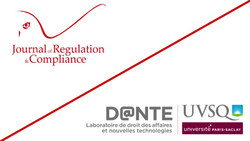
► co-organized between Laboratoire DANTE and the Journal of Regulation & Compliance (JoRC), this colloquium) is the core manifestation of the 2021 series of colloquia devoted to the general theme of Compliance Monumental Goals.
It will take place on 16th of September 2021, at the Maison du Barreau, in Paris.
This first work is in French but will be the basis of the book in English : Compliance Monumental Goals,

► Presentation of the colloquium Thematic: To understand the notion of "Monumental Goals", it is firstly necessary to take crossed perspectives on them, particularly through the prism of Labor Law, Environmental Law and Enterprise Law. Many questions appear. Does the notion of “Monumental Goals” present any substance in Law? Is it uniformly understood, or do specificities appear, forged by specific cultures and disciplinary practices? What are the sources and implicit references or echoes? Because even if we admit the part of novelty, there is undoubtedly an anchoring in traditional legal concepts, like the general interest or sovereignty. How does the shift from meta-legal (prima facie introduced by the concept) to legal take place, and where do any operational difficulties lie when legal actors are called upon to act? The question of a possible categorization of "Monumental Goals" will thus be explored, through these three legal disciplines whose historicity, goals and implications for firms differ.
These reflections allow to ask why and how these "Monumental Goals" are developed. Indeed, what is the relevance of the association of "Monumental Goals" and Compliance? Beyond theoretical considerations relating to the meaning of Law, is this really an effective alloy encouraging companies to behave differently? By what ways? These questions arise in particular with regard to the imperatives of legal certainty and the operative nature of the concept. The question of "Monumental Goals" will thus be explored by the operational actors of compliance, both those who act within companies and those who act from the lato sensu State sphere, for understanding whether this notion is a pure rhetoric figure or constitutes a particularly promising lever for the evolution of market behavior.
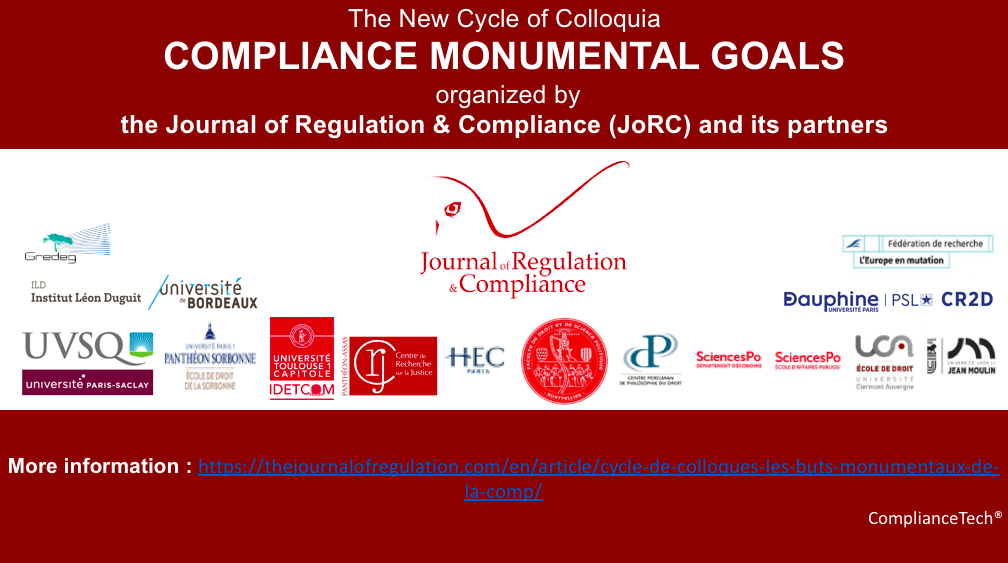
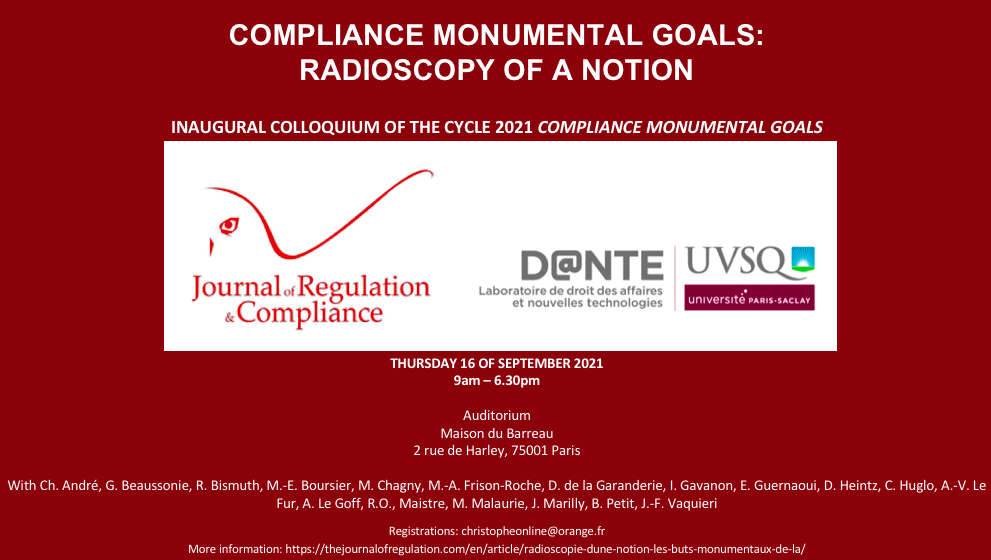
► with :
🎤 Christophe André, maître de conférences à l'Université Paris - Saclay (lecturer at the Paris-Saclay University)
🎤 Guillaume Beaussonie, professeur à l'Université Toulouse-1-Capitole (law professor at Toulouse-1-Capitole University)
🎤 Regis Bismuth, professeur de droit à Sciences po, Paris (law professor at Sciences po Paris)
🎤 Marie-Emma Boursier, doyen de l'Université Paris - Saclay (dean of the Paris-Saclay University)
🎤 Muriel Chagny, professeur l'Université Paris - Saclay, directrice du Laboratoire Dante (Professor at the Paris-Saclay University, director of the Laboratory Dante)
🎤 Marie-Anne Frison-Roche, professeur à Sciences po (Paris) (Professor at Sciences Po Paris)
🎤 Isabelle Gavanon, avocate à la Cour d'Appel de Paris (attorney before the Paris Court of Appeal)
🎤 Emma Guernaoui, ATER à l'Université Paris II Panthéon-Assas (ATER at Paris II Panthéon-Assas University)
🎤 Dominique Heintz, avocat à la Cour d' appel de Paris (attorney before the Paris Court of Appeal)
🎤 Christian Huglo, avocat à la Cour d' appel de Paris (attorney before the Paris Court of Appeal)
🎤Dominique de La Garanderie, avocat à la Cour d'appel de Paris (attorney before the Paris Court of Appeal)
🎤 Anne-Valérie Le Fur, professeur à l'Université Paris - Saclay (Professor at Paris-Saclay University)
🎤 Anne Le Goff, secrétaire générale déléguée d'Arkéa (Deputy Secretary general at Arkéa)
🎤 Roch-Olivier Maistre, président du Conseil supérieur de l'audiovisuel (President of the French audiovisual regulation authority)
🎤 Marie Malaurie, professeur à l'Université Paris-Saclay (professor at the Paris-Saclay University)
🎤 Jérôme Marilly, avocat général à la Cour d'Appel de Paris (General attorney before the Paris Court of Appeal)
🎤 Benoît Petit, maître de conférences (HDR) à l'Université Paris-Saclay (lecturer at the Paris-Saclay University)
🎤 Jean-François Vaquieri, Secrétaire Général d'Enedis (Secretary General of Enedis)
____
Read a detailed presentation below:

Sept. 15, 2021
Publications

 ► Full Reference: M.-A. Frison-Roche, Ex Ante Responsibility, Working Paper, December 2021.
► Full Reference: M.-A. Frison-Roche, Ex Ante Responsibility, Working Paper, December 2021.
____
📝This Working Paper has been the basis for an article written in French, "La responsabilité Ex Ante", published in the Archives de Philosophie du droit (APD), in the book 📗La Responsabilité (2022).
____
► Working Paper Summary: Quel est le temps auquel s'articule la responsabilité ? La question est si classique que toutes les réponses ont été dessinées : si l'on est responsable plus aisément par rapport au temps, car l'on peut alors plus aisément faire un lien entre la situation appréhendée, sa réalisation dans le passé la rendant plus facilement connaissable, et le poids de "responsabilité" que l'on impute sur une personne, l'on peut articuler la responsabilité avec le futur. Si l'on brise le poids de cette responsabilité avec un évènement ou une situation, par exemple. Le Principe Responsabilité de Jonas ou l'Ethique de la Responsabilité font ainsi voyager la Responsabilité dans le temps, par un rapport entre le Droit et l'Ethique.
D'ailleurs l'on pourrait soutenir que le Droit peut faire ce qu'il veut et imputer une responsabilité à quiconque pour le temps qu'il désigne, par exemple désigne comme porteur d'une responsabilité, c'est-à-dire d'un poids, celui qu'il veut. Le "responsable" serait alors le titulaire d'une sorte de "poids pur", qui le charge parce que le Droit l'a voulu pour le temps qu'il veut, par exemple un devoir d'agir pour que le futur soit dessiné comme le veut le Droit, alors même que le Responsable n'a rien à se reprocher dans le passé.
Mais les Cours constitutionnelle défendent un rapport minimal entre la Responsabilité et le poids que celle-ci fait porter une personne, fut-t-elle morale, gardant ainsi le lien consubstantiel entre le Droit et la Morale, la technique juridique de la Responsabilité ne pouvant équivaloir à celle d'un prélèvement obligatoire.
Ainsi l'idée d'une Responsabilité Ex Ante est simple dans son principe (I). Elle est celle d'un poids juridiquement posé sur une personne soit par elle-même (engagement), soit par la Loi ou par le Juge sur une personne de faire quelque chose pour que n'advienne pas quelque chose qui adviendrait ou pour qu'advienne quelque chose qui n'adviendrait pas si elle ne le faisait pas.
Mais les conditions juridiques pour admettre un tel poids alors même que le lien avec une situation passée serait brisé est plus difficile (II). On continue certes continuer à voir dans le futur le passé, ce qui facilite le voyage dans le temps, et fonda par exemple le contrôle Ex Ante du contrôle des concentrations. Mais l'on peut se briser même de cette facilité et regarder non plus le rapport entre le passé et le futur, mais le présent et le futur : ce que l'on sait déjà aujourd'hui du futur, ce qui met en jeu le rapport entre le Droit et la Science ; ce que l'on observe de l'emprise de la personne présente sur le moment présent, c'est-à-dire le Pouvoir, ce qui fait en jeu le rapport entre le Droit et l'Economie politique.
Dans cette dimension-là, la contrainte de la Responsabilité Ex Ante est alors maniée par le Juge, dont l'office lui-même devient un office Ex Ante. Les pouvoirs obligés Ex Ante par une telle responsabilité maniée par le Juge étaient les personnes en situation de pouvoir, sont non seulement les entreprises, mais encore les Etats, qui perdent le privilège - partagé avec les contractants - de disposer juridiquement du futur, et notamment en leur sein le Législateur.
Une telle révolution, qui se déroule sous nos yeux, s'explique parce qu'il faut agir maintenant pour que le futur ne soit pas catastrophique. La science nous informe qu'il le sera entéléchiquement. Il est donc juridiquement requis de désigner des responsables, non pas parce qu'ils auraient fait quelque chose, la dimension Ex Post n'étant pas le sujet, mais pour qu'ils fassent quelque chose, la Responsabilité Ex Ante étant un élément central de cette nouvelle branche du Droit qu'est le Droit de la Compliance.
Sept. 2, 2021
Interviews

► Référence complète : Frison-Roche, M.-A.,La nouvelle loi de protection des données en Chine est un « anti-RGPD », entretien avec Olivia Dufour, Actu-Juridique, 2 septembre 2021.
____
Les 3 questions posées étaient :
❓ La Chine a adopté fin août une grande loi de protection des données personnelles. Celle-ci est présenté dans les médias comme un équivalent de notre RGPD. Est-ce le cas ?
La réponse est : non.
(lire la réponse développée dans l'entretien)
____
❓ S'agit-il de simples effets indésirables ou bien du but poursuivi par le Législateur ?
La réponse est : Le but du Législateur n'est pas d'armer l'individu contre le pouvoir de l'Etat, c'est au contraire d'accroître le pouvoir de l'Etat, éventuellement contre lui.
(lire la réponse développée dans l'entretien)
____
❓ Si la compliance peut servir les intérêts d'Etats non-démocratiques, c'est donc qu'elle est potentiellement dangereuse ?
La réponse est : elle n'est dangereuse que définie comme "méthode d'efficacité des règles ; il faut définir le Droit de la Compliance par son "but monumental" qui est la protection des personnes. La contradiction de la loi chinoise nouvelle apparaît alors.
(lire la réponse développée dans l'entretien)
____

Aug. 25, 2021
Publications


🌐follow Marie-Anne Frison-Roche on LinkedIn
🌐subscribe to the Newsletter MAFR Regulation, Compliance, Law
____
► Full Reference: M.-A. Frison-Roche, M.-A., Monumental Goals, beating heart of Compliance Law, Working Paper, August 2021
____
📝This Working Paper is the basis for the article, "Les buts monumentaux, cœur battant du droit de la compliance", constituting the introduction ⤵
📕in its French version, of the book Les buts monumentaux de la Compliance, in the Series 📚Régulations & Compliance
📘in its English version, of the book, Compliance Monumental Goals, in the Series 📚Compliance & Regulation
____
► Summary of the Working Paper:
Compliance Law can be defined as the set of processes requiring companies to show that they comply with all the regulations that apply to them. It is also possible to define this branch of Law by a normative heart: the "Monumental Goals". These explain the technical new legal solutions, thus made them clearer, accessible and anticipable. This definition is also based on a bet, that of caring for others that human beings can have in common, a universality.
Through the Monumental Goals, appears a definition of Compliance Law that is new, original, and specific. This new term "Compliance", even in non-English vocabulary, in fact designates a new ambition: that a systemic catastrophe shall not be repeated in the future. This Monumental Goal was designed by History, which gives it a different dimension in the United States and in Europe. But the heart is common in the West, because it is always about detecting and preventing what could produce a future systemic catastrophe, which falls under "negative monumental goals", even to act so that the future is positively different ("positive monumental goals"), the whole being articulated in the notion of "concern for others", the Monumental Goals thus unifying Compliance Law.
In this, they reveal and reinforce the always systemic nature of Compliance Law, as management of systemic risks and extension of Regulation Law, outside of any sector, which makes solutions available for non-sector spaces, in particular digital space. Because wanting to prevent the future (preventing evil from happening; making good happen) is by nature political, Compliance Law by nature concretizes ambitions of a political nature, in particular in its positive monumental goals, notably effective equality between human beings, including geographically distant or future human beings.
The practical consequences of this definition of Compliance Law by Monumental Goals are immense. A contrario, this makes it possible to avoid the excesses of a "conformity law" aimed at the effectiveness of all applicable regulations, a very dangerous perspective. This makes it possible to select effective Compliance Tools with regard to these goals, to grasp the spirit of the material without being locked into its flow of letters. This leads to not dissociating the power required of companies and the permanent supervision that the public authorities must exercise over them.
We can therefore expect a lot from such a definition of Compliance Law by its Monumental Goals. It engenders an alliance between the Political Power, legitimate to enact the Monumental Goals, and the crucial operators, in a position to concretize them and appointed because they are able to do so. It makes it possible to find global legal solutions for global systemic difficulties that are a priori insurmountable, particularly in climate matters and for the effective protection of people in the now digital world in which we live. It expresses values that can unite human beings.
In this, Compliance Law built on Monumental Goals is also a bet. Even if the requirement of "conformity" is articulated with this present conception of what Compliance Law is, this conception based on Monumental Law is based on the human ability to be free, while conformity law supposes more the human ability to obey.
Therefore Compliance Law, defined by the Monumental Goals, is essential for our future, while conformity law is not.
________
Read the developments below⤵️
June 29, 2021
Thesaurus : Soft Law
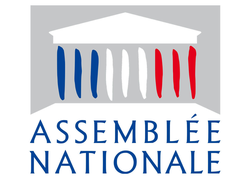
► Référence complète : Assemblée Nationale, Bâtir et promouvoir une souveraineté numérique nationale et européenne, Rapport d'information, Warsmann, J.-L., (prés.) et Latombe, Ph., (rapp.), 29 juin 2021 (2 t.).
___
____
June 25, 2021
Compliance: at the moment

►Under the scientific direction of Professor Emmanuelle Claudel, the French Association Droit et Commerce devotes its annual conference to ➡️📅 "La concurrence dans tous ses états". In her introduction retracing the entire evolution of this Law, Emmanuelle Claudel underlined that competition Law takes a distance from its basic concepts, such as the notion of "market". The branch of Law is finding more and more points of contact with Regulatory and Compliance Law.
____
In fact, in an economic and social system whose organization needs to be readjusted, the notion of “chain" must find its rightful place in conjunction with the notion of "market". For many objects, it is relevant to think not only in terms of "market" but in terms of chains. Indeed the "chain" gives consistency to the object itself. For example forests or food, as European Commission did (I).
But looking more concretely at the economic space, directly seeing people and things, such as agricultural products and what they are used for, that is to say to feed human beings, then this "Monumental Goal" must be entrusted to Crucial Entreprises the task of achieving it (II). Compliance Law can in the future caring of this, by setting new obligations, but also by loosening the so violent relationship, by its very indifference, between competition and food products.
I. NO LONGER THINK ONLY IN TERMS OF "MARKETS" BUT IN TERMS OF CHAIN: THE EXAMPLE FROM THE FARM TO THE FORK
We are starting to assert this for the forest but also for agriculture that the European Commission now connects with food. So food should not be seen simply as a succession of "markets". In fact, if we only conceive them in this way, the agricultural markets, which should benefit from the financing offered by financial markets, are sometimes grabbed by them, which can literally starve the world rather than helping to feed it.
Today, we agree to think about agriculture as a "chain" and, as the European Commission writes: From farm to fork. Indeed if agriculture is an important "sector" it is because it allows to feed the population. This basic fact has often been forgotten, in particular because competition Law, based on trade in products and not on the products themselves (of which it only measures the substituability, to identify the relevant markets) is not interested in what things are made for. We should not blame it, but in return, it cannot claim to dominate everything, since it is only pertinent for this small part of our life.
European Commission, which is emerging more and more from the neutral notion of the market to move towards the substantive notions of products and of what they are made for, of their results (happy or unhappy), is in the process of setting up an industrial policy and what could be a real agricultural policy, which is not made only of subsidies.
It consists in saying that it is necessary to design a chain which starts from the soil, its agricultural and livestock use to achieve what it is for: feeding the population.
It seems simple, but in a Law dominated by the sole Competition Law, which fought for example by the techniques of price support, it is a new way, because it is concrete, to conceive.
But how to do it ?
Because Economy does not necessarily have to be administered, Compliance Law can be of great help, especially through the wholesale markets.
II. INTERNALIZING THE MONUMENTAL GOALS OF AGRICULTURAL SECTORS IN THEIR CRUCIAL ENTERPRISES
Rather than administering the sectors, it is advisable to internalize in crucial companies the Monumental Goals which concern the future of the social group, for example feeding the population.
It is for this reason that we must conceive "wholesale markets", not only as does Competition Law, which qualifies them as markets between the producers and the resellers, but as companies which are, within vital chains, are in charge of supervising the link between upstream and downstream so that the goal is realized.
This is why these companies are directly concerned by Compliance Law, in its not mechanical definition of Compliance with the legal requirements applicable to them (which is our obligation to all) but in its definition which puts Compliance as something beyond Competition Law (➡️📝Frison-Roche, M.-A., Competition Law and Compliance Law, 2018)
Wholesale markets for food therefore have a decisive role to play, as demonstrated by the French Rungis market company which, during the time of the health crisis, helped to ensure the continuity of supply (see more generally Journal of Regulation & Compliance (JoRC) and Montpellier University, ➡️📅colloquium Public Norms and Compliance in times of crisis: monumental goals put to the test, contributions serving as a basis for a chapter in ➡️📘Compliance Monumental Goals, 2022).
The internalization of these Goals in Companies resolves the aporia with which States are confronted in their intimacy with the notion of borders.
Indeed, il is useful to adopt a definition of "wholesale markets" no longer through the definition of the "market" but through the definition of "the crucial enterprise", which is itself "regulated" (Frison- Roche, M.-A., ➡️📝The Crucial Companies and their Regulation, 2014).
"Wholesale markets" are businesses where retailers go to get their supplies every day, remembering what the market place was like, remembering the time when the market is the place where human beings met, where the exchanges were not between capital and commodities but between people (Supiot, A., ➡️📕Mondialisation ou Globalisation, 2019).
These companies are grouped together in a global association: the World Union of Wholesale Markets. For wholesale companies, it is a question of coming together to ensure that the chains operate from soil maintenance to the mouths of human beings.
Because it is so difficult to find a World Regulator which is at the same time legitimate and effective in agricultural matters.
It is possible that a public regulator is more legitimate but it is for the moment impossible to establish worldwide (see generally ➡️📕Collart-Dutilleul, Fr. and Le Dolley, E., ed., Droit, économie et marchés de matières premières agricoles, 2013).
Therefore, an alliance between the political authorities, which care about public health and crucial companies, of which these "wholesale markets" are an example, by "Compliance Obligations" thus understood, is a concrete prospect.
This then results in an obligation and a power of Vigilance and coordination, which can already be found in banking (a sector where Compliance Law is more mature than elsewhere) which must develop, rather than being the object of the segmentation that, by nature, traditional Competition Law generates, market by market, market against market.
______
► subscribe to the French Newsletter MaFR ComplianceTech®
June 23, 2021
Conferences
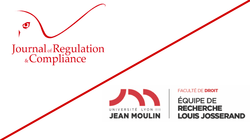
 Full reference: Frison-Roche, M.-A., The judge-judged: Articulate words and things face to the difficult conflicts of interest, in L'entreprise instituée Procureur et Juge d'elle-même par le Droit de la Compliance, colloquium co-organized by the Journal of Regulation & Compliance (JoRC) and Lyon 3 Law School, 23rd of June 2021.
Full reference: Frison-Roche, M.-A., The judge-judged: Articulate words and things face to the difficult conflicts of interest, in L'entreprise instituée Procureur et Juge d'elle-même par le Droit de la Compliance, colloquium co-organized by the Journal of Regulation & Compliance (JoRC) and Lyon 3 Law School, 23rd of June 2021.
____
This conference was in French ; the Working Paper on which this conference was based is in French and in English: The judge-judged: Articulate words and things face to the stressful conflicts of interest
📅 June 23, 2021, 9h30 - 18h30
🧭 Lyon, Lyon 3 Law School, "Salle de la Rotonde" and online
____
📊 Read the slides on which this conference is based (in French)
🎥 See the video of this conference.
📝 Read the general program of this colloquium (in French)
📝 Read the working paper on which this conference is based (in English)
___
📅 This colloquium is part of the cycle of colloquia in 2021 organized by the Journal of Regulation & Compliance (JoRC) and its partners about Compliance Juridictionnalization.
📕 📘 The conference is the first basis for the writing of an article, forthcoming in a book whose the French version is La juridictionnalisation de la Compliance, co-published by the Journal of Regulation & Compliance (JoRC and Dalloz, and whose the English version Compliance Juridictionnalisation, is co-published by the Journal of Regulation & Compliance (JoRC) and Bruylant.

____
🔻 Summary of the conference: read below.